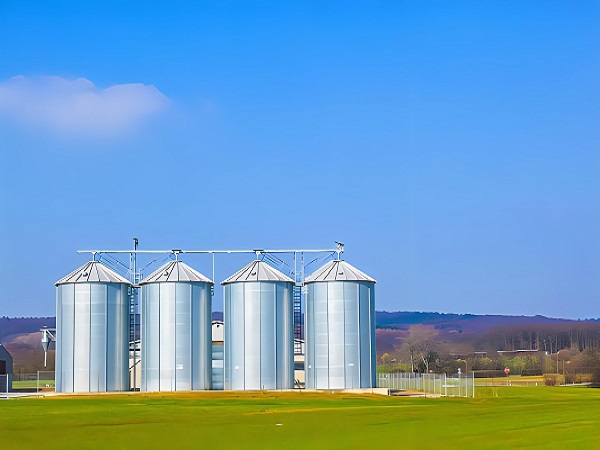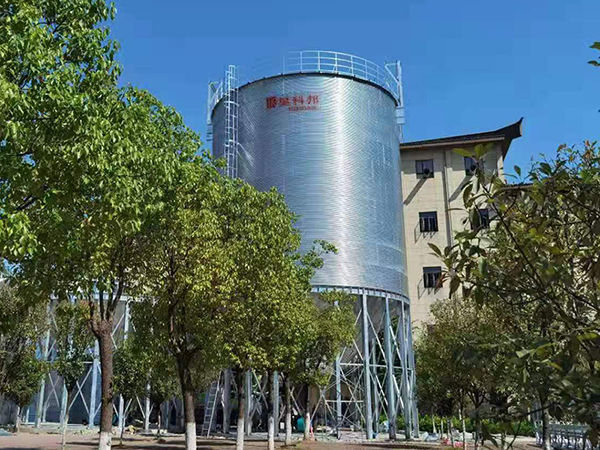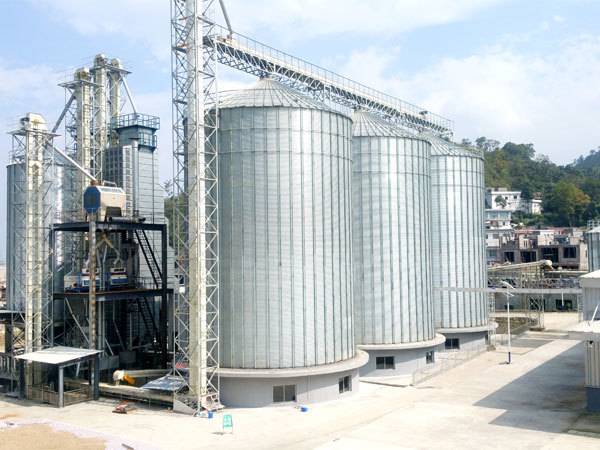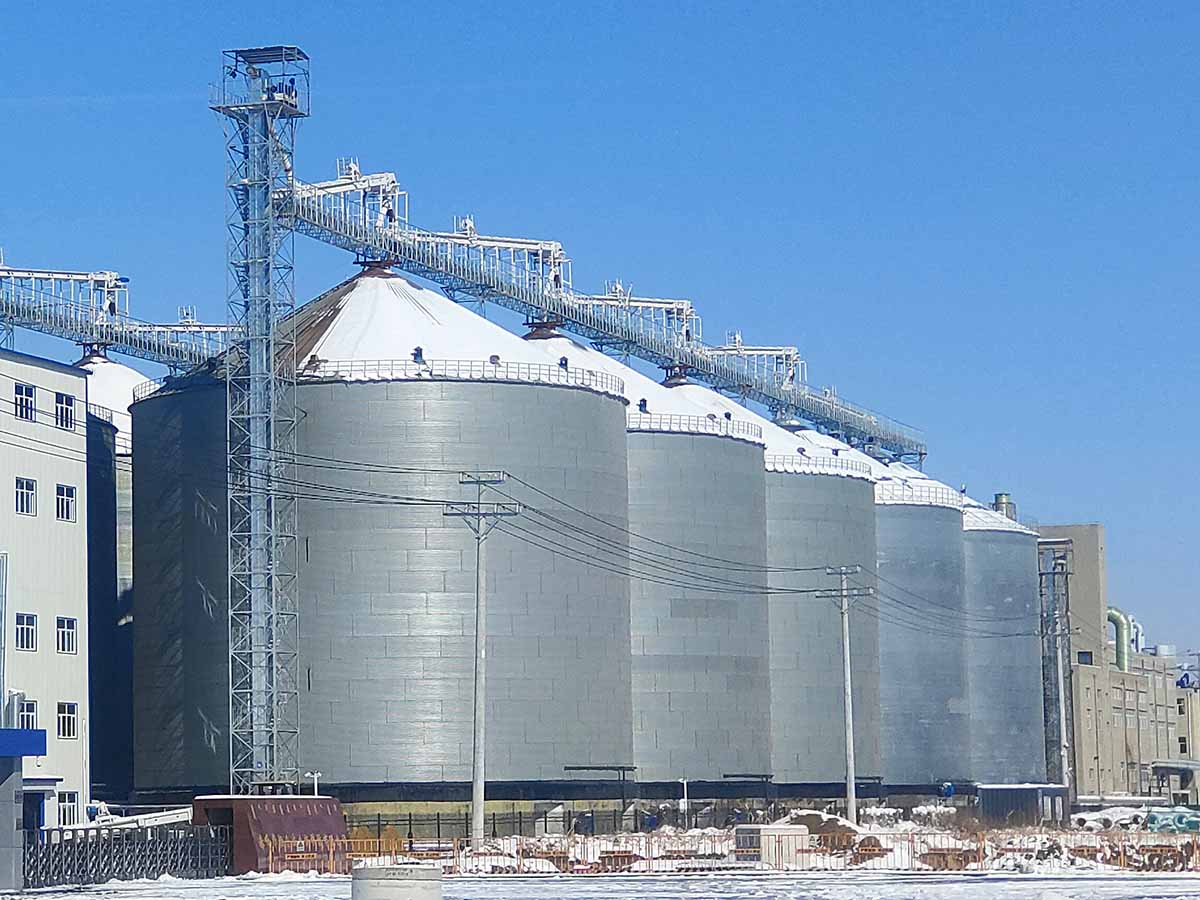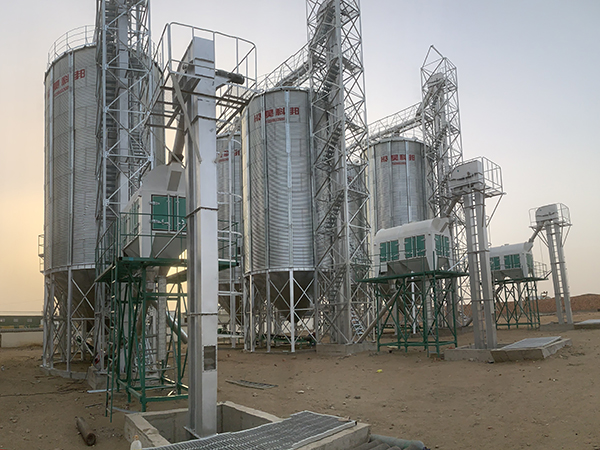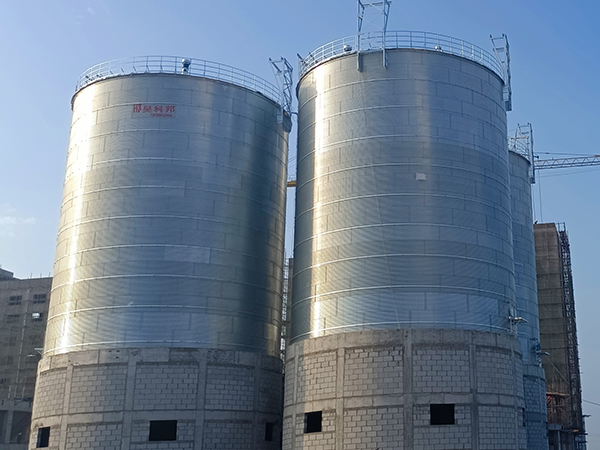Peanut silo
A peanut silo is a specialized storage facility designed for the storage and management of peanuts.
Peanut silo Introduction
A peanut silo is a specialized storage facility designed for the storage and management of peanuts. These silos are crucial in modern agriculture and the food processing industry, providing a secure and efficient environment to maintain the quality and freshness of peanuts. The design and functionality of peanut silo take into account the specific storage needs of peanuts, including moisture control, mold prevention, ventilation, and temperature regulation.
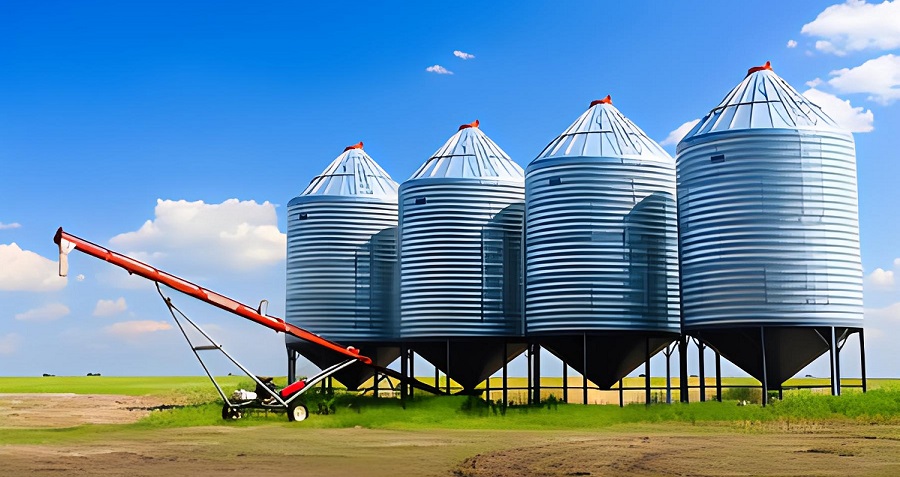
Main Functions of Peanut Silos
Moisture and Mold Prevention
Peanuts are prone to absorbing moisture, and high humidity can lead to mold and spoilage. Peanut silos prevent external moisture from entering through excellent sealing and appropriate ventilation systems while removing excess moisture from within.
Ventilation System
A good ventilation system ensures proper air circulation inside the silo, preventing peanuts from spoiling due to high humidity. Automated ventilation equipment can adjust the airflow based on internal humidity and temperature, maintaining an optimal storage environment.
Temperature Control
The storage effectiveness of peanuts is significantly affected by temperature. Peanut silos are equipped with temperature sensors and automatic temperature control systems that monitor and adjust the internal temperature in real time, ensuring it stays within an ideal range.
Pest and Insect Prevention
Peanut silos are usually designed with pest-resistant materials and structures to prevent damage from insects and other pests.
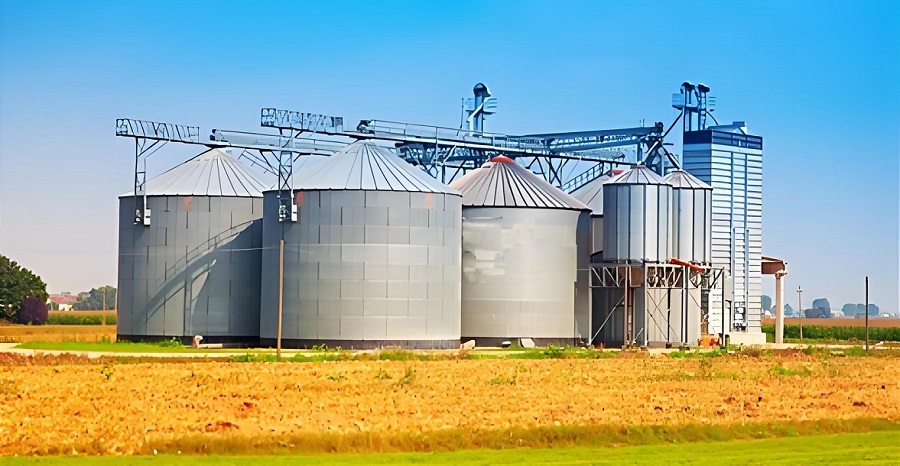
Main structure of peanut silo
1. Silo Shell
The silo shell is the main body of the silo, usually cylindrical in shape. It is constructed from durable materials like stainless steel, galvanized steel sheets, or specially coated steel sheets to ensure long-term durability and resistance to corrosion caused by peanut oils. The shell provides the primary containment for the stored peanuts.
2. Roof
The roof of the silo protects the stored peanuts from environmental elements such as rain, dust, and sunlight. It is often designed with a slight slope to facilitate water runoff and is made from the same durable materials as the silo shell. Some roofs may include hatches or vents for additional ventilation and access.
3. Base/Foundation
The base or foundation of the silo supports the entire structure and ensures stability. It is typically constructed from reinforced concrete to handle the significant weight of the filled silo and to provide a level and stable platform. The base must be properly engineered to prevent settling or shifting over time.
4. Ventilation System
The ventilation system is crucial for maintaining proper air circulation within the silo. It includes fans, ducts, and vents strategically placed to ensure even airflow throughout the stored peanuts. Automated systems with sensors can adjust ventilation based on real-time measurements of humidity and temperature inside the silo.
5. Temperature Control System
A temperature control system is integrated into the silo to monitor and regulate the internal temperature. This system includes temperature sensors placed at various levels within the silo and connected to a central control unit. The control unit can activate heating or cooling mechanisms to maintain the desired temperature range.
6. Moisture Control System
Moisture control is vital to prevent mold and spoilage. The silo is equipped with moisture sensors and dehumidifiers to maintain optimal humidity levels. The moisture control system works in conjunction with the ventilation system to remove excess moisture from the air inside the silo.
7. Loading and Unloading Systems
Efficient loading and unloading systems are essential for the smooth operation of the silo. These systems typically include:
- Conveyor Belts: Used for transporting peanuts into and out of the silo.
- Elevators: Vertical transport mechanisms that move peanuts to different levels within the silo.
- Hoppers and Discharge Chutes: Funnels that direct peanuts into or out of the silo during loading and unloading processes.
8. Access Doors and Hatches
Access doors and hatches provide entry points for maintenance, inspection, and cleaning. These access points are designed to be securely sealed to maintain the internal environment of the silo. They are strategically placed for convenient access without compromising the structural integrity or sealing properties of the silo.
9. Monitoring and Control Systems
Modern peanut silos are equipped with advanced monitoring and control systems. These systems include:
- Sensors: For measuring temperature, humidity, and other environmental factors.
- Control Panels: Centralized units that allow operators to monitor conditions and adjust systems as needed.
- Automated Controls: Systems that automatically regulate ventilation, temperature, and moisture based on sensor inputs.
10. Structural Support Elements
Additional structural support elements such as beams, braces, and ladders ensure the stability and integrity of the silo. These elements are designed to withstand internal and external stresses, including the weight of the stored peanuts and environmental forces like wind and seismic activity.
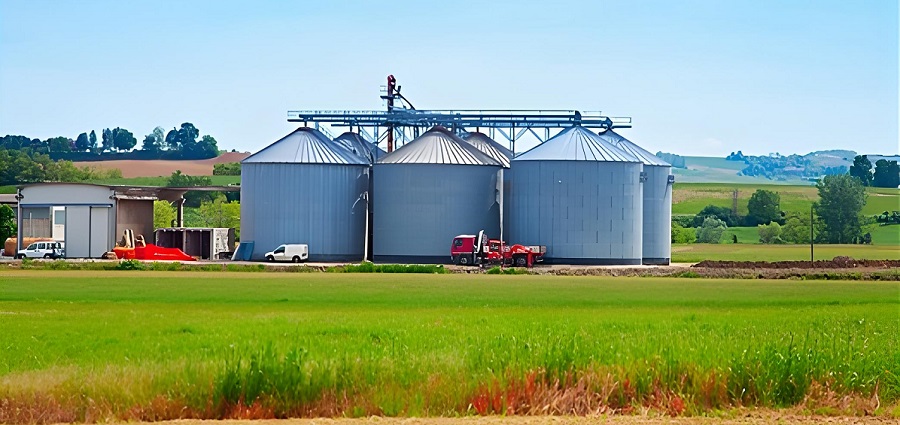
Main Advantages of Peanut Silo
1. Enhanced Storage Efficiency
Peanut silos are designed to maximize storage capacity while utilizing space efficiently. Their vertical structure allows for the storage of large quantities of peanuts in a relatively small footprint, which is especially beneficial for large-scale operations. Multiple compartments or levels within the silo enable the organized storage of different batches, improving overall storage efficiency.
2. Improved Quality and Freshness Preservation
Peanut silos are equipped with advanced systems to control temperature, humidity, and ventilation. These systems create an optimal storage environment that helps maintain the quality and freshness of peanuts. By preventing moisture buildup and mold growth, silos significantly reduce spoilage and extend the shelf life of stored peanuts.
3. Protection from Environmental Factors
Peanut silos offer robust protection against various environmental factors such as rain, dust, pests, and extreme temperatures. The durable materials used in their construction, along with tight sealing and pest-resistant features, ensure that peanuts remain unaffected by external conditions, preserving their quality.
4. Reduced Post-Harvest Losses
By providing a controlled environment, peanut silos minimize the risk of post-harvest losses due to spoilage, pests, and contamination. Effective moisture control, ventilation, and temperature regulation help maintain the integrity of peanuts, reducing the percentage of waste and enhancing overall profitability.
5. Cost-Effectiveness
Investing in peanut silos can lead to significant cost savings in the long run. Reduced spoilage and post-harvest losses mean fewer financial losses. Additionally, the efficiency of automated systems for loading, unloading, and monitoring reduces labor costs and increases operational efficiency. The durability and longevity of silos also mean lower maintenance and replacement costs over time.
6. Scalability and Flexibility
Peanut silos are available in various sizes and configurations, allowing for scalability based on the needs of different operations. Whether for small farms or large processing plants, silos can be customized to meet specific storage requirements. This flexibility ensures that businesses can scale their storage solutions as their operations grow.
7. Ease of Operation and Maintenance
Modern peanut silos are designed with user-friendly features that simplify operation and maintenance. Automated systems for ventilation, temperature, and moisture control reduce the need for constant manual intervention. Access doors and hatches make it easy to perform regular inspections, cleaning, and maintenance, ensuring that the silo remains in optimal condition.
8. Enhanced Safety
Peanut silos are built with safety features to protect both the stored peanuts and the personnel handling them. These features include secure access points, structural stability, and automated monitoring systems that alert operators to any issues that need attention. The use of non-toxic, food-grade materials ensures that the peanuts are stored safely without contamination risks.
9. Environmental Sustainability
By reducing spoilage and waste, peanut silos contribute to more sustainable agricultural practices. Efficient storage helps ensure that more of the harvested peanuts reach the market, reducing the environmental impact associated with wasted resources. Additionally, some modern silos incorporate energy-efficient technologies that minimize energy consumption, further enhancing their sustainability.
10. Improved Market Competitiveness
Businesses that utilize peanut silos can offer consistently high-quality products, enhancing their reputation and competitiveness in the market. Reliable storage ensures a steady supply of peanuts, allowing businesses to meet customer demand effectively and capitalize on market opportunities.
Application scope of Peanut Silo
Coban Silo is widely used for grain storage such as wheat, corn, soybean, paddy, rice, soybean meal, barley, malt, sunflower seeds, rapeseed, peanuts, flour, and other powder materials, oat, special Silo, and seeds, etc.
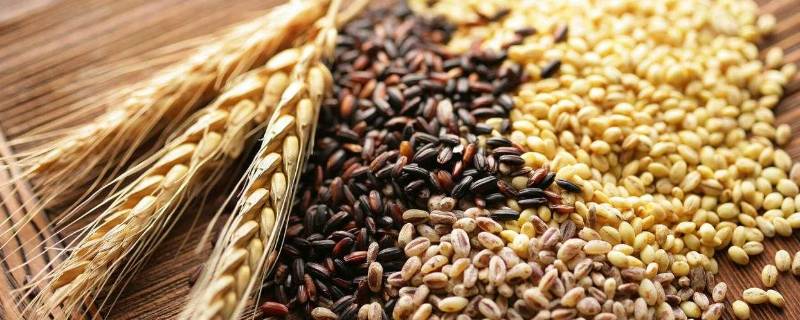
Peanut Silo technical parameters
Scientifically speaking, the Silo capacity should be measured with volume (m3). Even in the same grain Silo, the storage tons will be different for different grains with different densities. The following table is calculated based on a Silo density of 0.75kg/m3, and surely HKB customizes Silo systems unique for you.
| Most Popular Hopper Bottom Steel Silo Technical Specifications | ||||||||
| Capacity | 50Ton | 100Ton | 150Ton | 200Ton | 300Ton | 500Ton | 1000Ton | 1500Ton |
| Model | TCZK
03605 |
TCZK
04507 |
TCZK
05507 |
TCZK
06406 |
TCZK
07307 |
TCZK
07313 |
TCZK
11010 |
TCZK
12811 |
| Diameter(m) | 3.667 | 4.584 | 5.500 | 6.417 | 7.334 | 7.334 | 11.000 | 12.834 |
| Total Height(m) | 9.56 | 12.53 | 13.25 | 12.85 | 14.70 | 21.42 | 20.95 | 23.51 |
| Volume(m³)
Density:0.75ton/m³ |
69 | 150 | 222 | 273 | 415 | 699 | 1346 | 2039 |
| Most Popular Flat Bottom Steel Silo Technical Specifications | ||||||||
| Capacity | 1000Ton | 1500Ton | 2000Ton | 2500Ton | 3000Ton | 5000Ton | 8000Ton | 10000Ton |
| Model | TCK
10014 |
TCK
11915 |
TCK
13715 |
TCK
15514 |
TCK
15518 |
TCK
18321 |
TCK
24718 |
TCK
25621 |
| Diameter(m) | 10.084 | 11.918 | 13.750 | 15.584 | 15.584 | 18.334 | 24.751 | 25.668 |
| Total Height(m) | 18.69 | 20.34 | 20.87 | 20.30 | 24.78 | 28.60 | 26.99 | 30.60 |
| Volume(m³)
Density: 0.75ton/m³ |
1335 | 2009 | 2701 | 2467 | 4145 | 6693 | 10879 | 13484 |
After-sale Service
- – HKB provides advanced grain safety storage technology to assure your grain silo 100% quality stability.
- – grain silo Quality guarantee is one year after installation and commissioning or 18 months after leaving China Port. Maturity is the first.
- – 7 days x 24 hours service, within 24 hours reply/solve of any technical issues upon request.
- – Routinely telephone track to remove all might be problems grain silo or issues guarantying the whole system grain silo long-lasting safety and reliability.
- – HKB will consider all other needs like customs clearance, sea delivery, insurance, customs tax benefit plan, documentation, etc. So our respected Users feel so relaxed and easy to get the grain silo system well.

